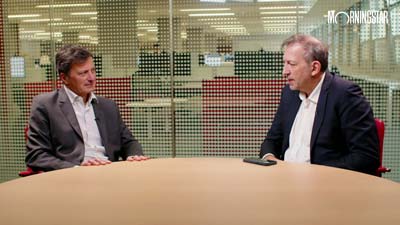TRANSCRIPT
Valerio Baselli: Hello and welcome to the Morningstar Investment Conference in Paris. I'm Valerio Baselli and today I'm joined by Jeremy Podger, Global Equities Portfolio Manager for Fidelity International.
Thanks for being here, Jeremy.
Jeremy Podger: Thank you.
Baselli: So, if we take global equity exposures, most of the time it will be biased towards developed markets. Why is that? Is it just a market capitalization effect or maybe the risk/reward ratio is more profitable?
Podger: Now, I think, it really is essentially a market capitalization thing. Developed markets have more developed capital markets. Emerging markets almost by definition are more risky, less developed and less of the industries are actually listed on stock markets. So, I think that's appropriate. Clearly, emerging markets will continue to take or have a disproportionate effect in terms of risk and they will have individual types of risks associated. So the macroeconomic picture in emerging markets is always much more important I feel than in developed markets.
Baselli: And staying on the developed world, we are living in a time where central banks are absolute key players in the markets. If we take the three macro areas, U.S. and Japan and Europe, we see that. So, where do you see the most interesting environment from an investor's point of view right now?
Podger: I think there are opportunities in all of these markets and they have different individual merits. So, if we take the U.S. to start off with, the U.S. has an amazing depth and variety of particularly growth companies. So, right now as a global investor, I look towards the U.S. particularly for its expertise in technology and healthcare, but certainly we've been finding more general opportunities across the U.S. more recently.
Europe is a different case. The economic growth backdrop is not as strong as the States. And I think investors have become more cautious in recent years which really has meant that the defensive parts of the European markets have become more expensive. So, I think you need to look for the recovery candidates, some of the less recognized opportunities in Europe there. Within a global portfolio we are a little bit below benchmark in Europe.
In contrast, in Japan, I think there's a very interesting situation there and I think that to a large extent the monetary background is a bit of distraction. We should really be focusing on what companies themselves are doing at a grassroots level and there has been a really important transformation in the past two to three years in terms of corporate governance. So there is better corporate governance. And importantly, companies now are focused much more rewarding shareholders. So, I think that Japan is coming from a position of relatively low valuation of poor shareholder returns but is improving more rapidly than other parts of the world right now.
Baselli: Okay. And finally, what is your opinion on the possible effects of the Brexit on the Eurozone markets?
Podger: Well, I mean, clearly, we have two different effects there. In terms of the impact on the U.K., I think that the primary impact we've seen so far has been on the currency. And unlike the Eurozone, the U.K. has a difficult position in terms of its trade account and its current account; in fact, a record current account deficit and I think this is largely because the U.K. in fact has been growing faster than the rest of Europe. The rest of Europe, it's the other way around. So, from where we are now, I think it is entirely plausible that sterling will see further deterioration over the medium term, which means that if we're looking for opportunities in the U.K., we should be really focusing on companies that are addressing the international marketplace.
As far as the impact on the rest of Europe is concerned, I think that's very difficult to read. And as a global equities manager, it's not necessarily my specialty, but you're really talking about the political effects and ramifications. They are difficult to read. My reading of the backdrop in Europe as far as the economy is concerned, is that we are in a slow but fairly steady growth stage at this point. So, at this point, I'm not particularly worried in terms of any sort of systemic effect.
Baselli: Perfect. Thanks a lot to Jeremy Podger.
Podger: Thank you.
Baselli: Thank you.





















